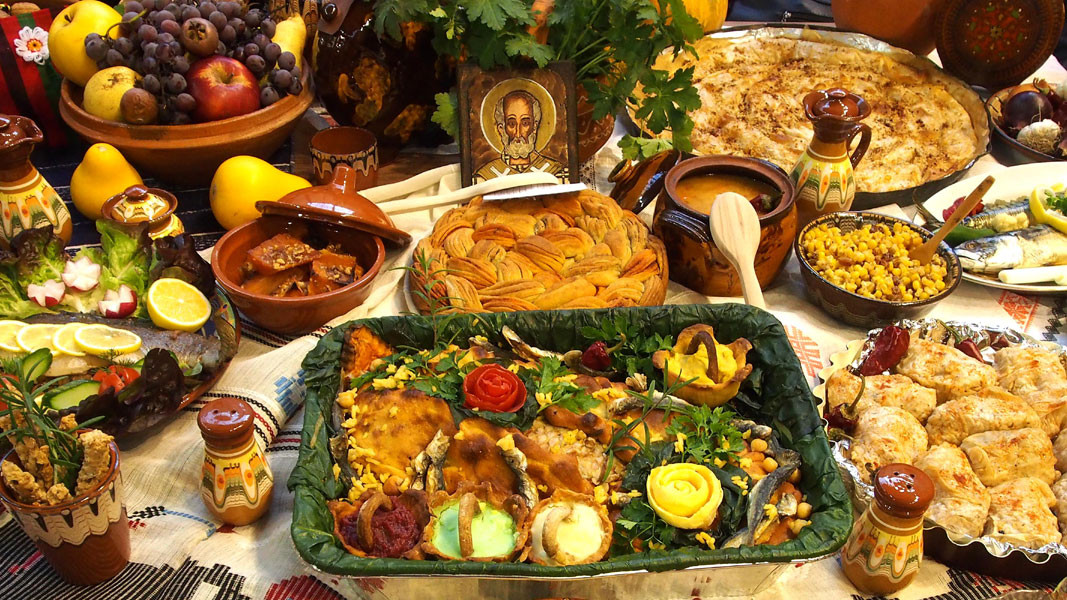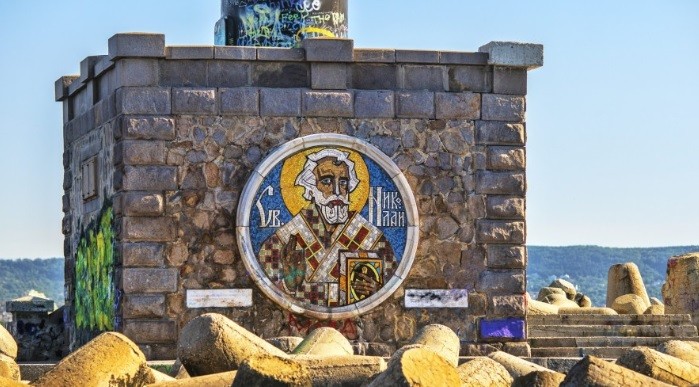Whenever December comes, it feels that holidays become more numerous than working days here in Bulgaria. Regardless of the stressful pile of urgent tasks typical for the period before Christmas, the “wave” of name days and all sorts of occasions for celebration take us into their whirling rhythm. The first big day of the pre-Christmas cycle of feasts is December 6th.On this date the Orthodox Church honours the feast of Saint Nicholas the Wonderworker (also known as Saint Nicholas of Myra). The feast is popular in Bulgaria as Nikulden.
Troparion of St. Nicholas
Situated on the calendar in the middle of the Christmas fast, the day of Saint Nicholas is among the most loved and revered Christian and folk holidays. Bankers, sailors and fishermen celebrate their professional holiday, with over 200,000 Bulgarians bearing the saint’s name. To this day, a traditional fish dish needs to be part of the festive table, usually a stuffed carp, along with boiled corn, wheat or bulgur, and of course, a ritual bread loaf.

Like most Christian saints, St. Nicholas has gained his own image in the folk tradition - one of the many proofs of the miraculous power of folklore to incorporate and build upon the ancient layers of human wisdom. It is believed that when He created the earth, the Lord gathered five saints and gave each one to rule one of the elements.
 St. Nicholas was given the seas, rivers, and lakes. In folk songs, tales and legends, St. Nicholas is the master of the depths of the sea and their inhabitants, of the storms, the patron saint of sailors and fishermen. These ideas are completely in line with the story of the miraculous rescue of sailors during the terrible storm described in the saint's life. In some folk songs, St. Nicholas has wings and not only reaches the seabed, but can also fly high in the skies. Every moment he is ready to come to the rescue if someone is in trouble. He is also described as a handsome young man riding his horse and as an old man from whose beard snow is falling down.
St. Nicholas was given the seas, rivers, and lakes. In folk songs, tales and legends, St. Nicholas is the master of the depths of the sea and their inhabitants, of the storms, the patron saint of sailors and fishermen. These ideas are completely in line with the story of the miraculous rescue of sailors during the terrible storm described in the saint's life. In some folk songs, St. Nicholas has wings and not only reaches the seabed, but can also fly high in the skies. Every moment he is ready to come to the rescue if someone is in trouble. He is also described as a handsome young man riding his horse and as an old man from whose beard snow is falling down.
 St. Nicholas is the patron saint of the city of Burgas, as well as a number of other Black Sea towns.
St. Nicholas is the patron saint of the city of Burgas, as well as a number of other Black Sea towns.
In the folklore image of the saint, researchers also find the traits of the mythical dragon man, who may be with one soul in one place and with his second soul wherever he wants. The eminent Bulgarian ethnographer Dimitar Marinov has recorded similar stories and songs. According to them, when he was at the table, and someone got in trouble at sea, St. Nicholas did not leave the table but fell asleep. In fact, this "falling asleep" enabled him to fly away with one of his two souls and rescue the people in distress. Dimitar Marinov also quotes a song that used to be performed at Nikulden during the festive meal. It describes how Saint Nicholas was preparing his horse to go to the festive table along with all saints because the Young God was born. When they went to the Virgin Mary, the saints sat at the table. St. Nicholas took the golden cup that St. Basil gave him, but fell asleep and dropped the cup. A moment before the wine was spilled on the floor, he caught it. He then explained that he had not fallen asleep, but had "transported" to another place to mitigate the turbulent winds and save three ships from sinking.
St. Nicholas is also considered the patron saint of the family, home, property and goods.
English: Rossitsa Petcova
Photos: BTA and BGNES
The Bulgarian village of Turia at the southern foothill of the Balkan Range is welcoming over a thousand participants in the Masquerade Games "Old Men in Turia". This year's edition of the festival on 30 March will feature 28 mummers' groups from all..
"In a vast region in northern Bulgaria, St. Todor is somehow perceived as a demonic character... He visited gatherings of unmarried girls, which were prohibited during that period; he acquired the appearance of a young bachelor, but distinguishable by..
Thousands of cowbells of different sizes and shapes filled the streets of Yambol with chiming, jingling and ringing at the 25th International Masquerade Festival "Kukerlandia". Згдшд More than two thousand mummers - called kukeri, sourvakari,..

+359 2 9336 661
